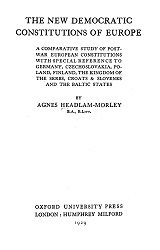The New Democratic Constitutions of Europe. A a comparative Study of Postwar European Constitutions with special Reference to Germany, Czechoslovakia, Poland, Finland, the Kingdom of the Serbs, Croats & Slovenes and the Baltic States
The New Democratic Constitutions of Europe. A a comparative Study of Postwar European Constitutions with special Reference to Germany, Czechoslovakia, Poland, Finland, the Kingdom of the Serbs, Croats & Slovenes and the Baltic States
Author(s): Agnes Headlam-Morley
Subject(s): History, Law, Constitution, Jurisprudence, History of Law, Constitutional Law, Recent History (1900 till today), Interwar Period (1920 - 1939)
Published by: CEEOL Digital Reproductions / Collections
Keywords: Democracy after WW I; Democracy in Europe; European Constitutions;
Summary/Abstract: Published in 1020 by Oxford University Press // Extract from the introduction: „Even in those countries with which we are here concerned, countries in which the democratic principle has been accepted unchallenged, there can yet be traced an underlying distrust of representative government and parliamentary institutions. Democracy has been accepted, but the forms of democratic government have been called in question. The criticism directed against such institutions may often be just; the new constitutions may in certain cases supply solutions to problems which must be faced also in this country; it must, however, always be borne in mind that merely because institutions originally borrowed from England do not work satisfactorily among other nations, it does not of necessity follow that they are not the institutions best fitted to the character and needs of the English race. The English system of parliamentary government is not a clever device of the constitutional lawyer. It is a natural product of the English character, a character which combines impatience of authority with the capacity to produce and follow a chosen leader. This system does not work so well amongst other nations because they have different national characteristics. The Germans are more willing to obey the authority of a superior, less ready to follow the leadership of an equal. A political leader striving for personal eminence is looked upon with contempt; an official administering the law, with respect. The Slavonic races may, in the hour of national danger, be roused to the most heroic acts of patriotism, and may be animated by the most noble spirit of self-sacrifice; in times of peace, they show themselves at once indifferent to public affairs and resentful of restraint. There is considerable danger that the failure on the Continent of an imperfect imitation of our constitution may react upon this country, and cause would-be reformers to look with disfavor upon a form of government that has served their country well; they may even be tempted to press for the ill-considered adoption of institutions which other nations, in despair at making the English system work amongst them, have devised out of their own genius—institutions which are probably as unsuited to our country as are ours to theirs.”
Series: CEEOL COLLECTION related to EUROPE / EU (Hist. / Pol. /Econ. ...)
- Page Count: 298
- Publication Year: 1929
- Language: English
- eBook-PDF
- Table of Content
- Introduction

